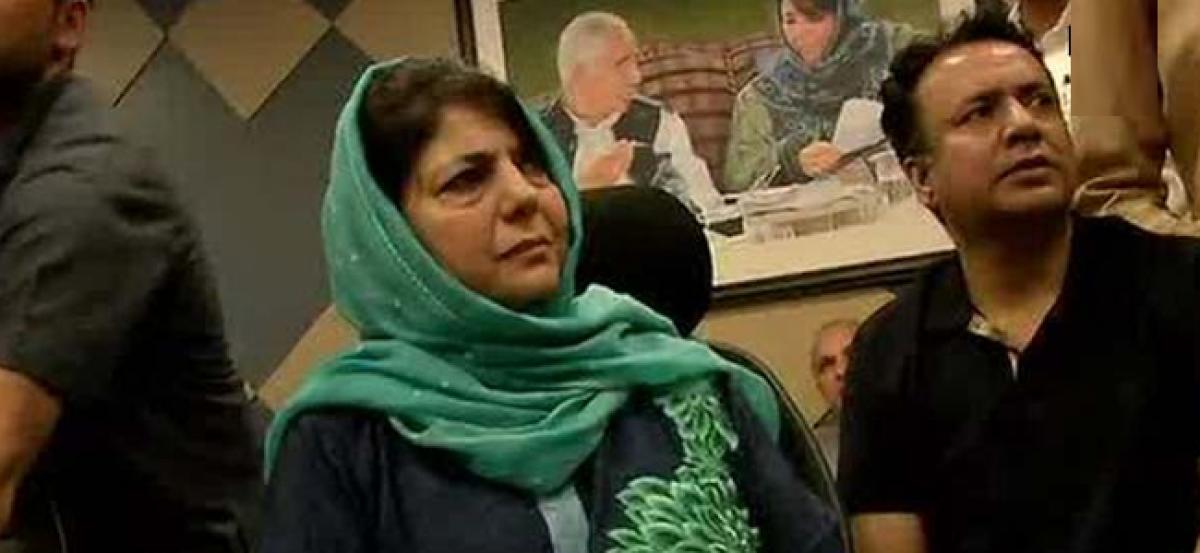Live
- CM Seeks 100% Central aid to two Metro rail projects
- India will be globally No. 1 by 2047: Naidu
- 300+ quintals Talambras to meet devotees’ demand
- ‘Save Telangana – Support BJP’ will be our mantra: Kishan Reddy
- FM seeks budget tweak ideas from stakeholders
- Centre committed to uplift AP: Nirmala
- Union Bank conducts MSME outreach prog
- PM thanks people for supporting saffron party
- YouTube Introduces ‘Premium Lite’ in the US: Affordable Ad-Free Viewing
- Kingston review: A visually rich horror-thriller that sets the stage well but could have deepened its supernatural menace
Just In

Mehbooba Mufti on Tuesday resigned as the Chief Minister of Jammu and Kashmir, after the Bharatiya Janata Party (BJP) pulled out of the alliance with the People\'s Democratic Party (PDP) in the state.
Srinagar (Jammu and Kashmir): Mehbooba Mufti on Tuesday resigned as the Chief Minister of Jammu and Kashmir, after the Bharatiya Janata Party (BJP) pulled out of the alliance with the People's Democratic Party (PDP) in the state.
"She (Mehbooba Mufti) has submitted her resignation (as Chief Minister of Jammu and Kashmir) to the Governor (Narinder Nath Vohra)," PDP's Naeem Akhtar said following the announcement.
The BJP's decision apparently came after its President Amit Shah held a meeting with the party's Jammu and Kashmir cabinet ministers.
Citing examples of the growing acts of "terrorism, violence and radicalisation" in the state over the past few years, BJP General Secretary Ram Madhav, while addressing a press conference in the national capital, said the party was left with no other option, but to discontinue its alliance with the PDP.
"We have taken a decision, it is untenable for BJP to continue in alliance with the PDP in Jammu and Kashmir, and hence we are withdrawing," Madhav said.
The differences between the BJP and the PDP cropped up following the Centre's decision to resume anti-terror operations in the state, which were suspended during the holy month of Ramzan.
"Terrorism, violence and radicalisation have risen and fundamental rights of the citizens are under danger in the Valley. Shujaat Bukhari's killing is an example. Keeping in mind the larger interest of India's security and integrity, the fact is that Jammu and Kashmir is an integral part of India. In order to bring control over the situation prevailing in the state, we have decided that the reign of power in the state be handed over to the Governor," Madhav added.
Madhav further alleged that the PDP has not shown a whole-hearted effort to control ceasefire violation from across the border.
"Centre did everything for the Valley. We've tried to put a full-stop to the ceasefire violations by Pakistan. The PDP has not been successful in fulfilling its promises. Our leaders have been facing a lot of difficulties from the PDP in developmental works in Jammu and Ladakh," Madhav said.
With the PDP-BJP coalition falling apart, the state might come under the governor's rule. However, Madhav cleared that the Centre will continue its efforts to stop any kind of violence in the state.
"Even if Governor's rule is imposed in Jammu and Kashmir, our efforts to fight terrorism will continue," he said.
He also said that the BJP formed an alliance with the PDP just to "respect the mandate of the people".
"If we would not have formed government at that time, Governor's rule or Presidential rule would have been imposed in the Valley. We had an alliance with them just for the mandate that was given by people," he said.
The BJP's decision to pull out of the alliance came as a surprise for the PDP.
"We tried our best to run the government with the BJP. This had to happen. This is a surprise for us, because we did not have any indication about their decision," PDP Spokesperson Rafi Ahmad Mir told ANI.
The BJP and PDP have had a love-hate relationship from time to time in the last three years.
The two parties formed a coalition government in 2015 after the state elections threw up a hung assembly. However, both of them were ideologically divided on a variety of issues.
The BJP had 25 seats in the Jammu and Kashmir Assembly, while the PDP had 28.
In April this year, their alliance seemed to be under strain after the gang rape and murder of an eight-year-old girl from a Muslim community in Jammu's Kathua district.
This will be the fourth time in the last 10 years if a Governor's rule is imposed in Jammu and Kashmir.
It was imposed in July 2008, following the resignation of then Chief Minister Ghulam Nabi Azad in the wake of the PDP pulling out of the coalition government with the Congress.
The state was under governor's rule in December 2014, following the hung verdict in the assembly elections that year.
Governor's rule was again imposed in the state in January 2016 following the death of then chief minster Mufti Mohammed Sayeed, as his daughter Mehbooba Mufti seemed reluctant to continue the alliance with the BJP.
As for the Congress, party leader Ghulam Nabi Azad has made it clear that the party has no intentions to form an alliance with the PDP again.
"Whatever has happened is good. People of Jammu and Kashmir will get some relief. They (BJP) ruined Kashmir and have now pulled out. Maximum number of civilians and army men died during these three years. That question does not arise (on forming alliance with PDP)," Azad said.

© 2025 Hyderabad Media House Limited/The Hans India. All rights reserved. Powered by hocalwire.com







